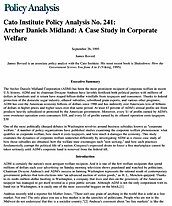The Archer Daniels Midland Corporation (ADM) has been the most prominent recipient of corporate welfare in recent U.S. history. ADM and its chairman Dwayne Andreas have lavishly fertilized both political parties with millions of dollars in handouts and in return have reaped billion-dollar windfalls from taxpayers and consumers. Thanks to federal protection of the domestic sugar industry, ethanol subsidies, subsidized grain exports, and various other programs, ADM has cost the American economy billions of dollars since 1980 and has indirectly cost Americans tens of billions of dollars in higher prices and higher taxes over that same period. At least 43 percent of ADM’s annual profits are from products heavily subsidized or protected by the American government. Moreover, every $1 of profits earned by ADM’s corn sweetener operation costs consumers $10, and every $1 of profits earned by its ethanol operation costs taxpayers $30
One of the most politically charged debates in Washington revolves around business subsidies known as “corporate welfare.” A number of policy organizations have published studies examining the corporate welfare phenomenon: what qualifies as corporate welfare, how much it costs taxpayers, and how much it damages the economy. This study examines the dynamics of corporate welfare somewhat differently by investigating ADM as a classic case study of how those subsidies are obtained, how the welfare state encourages such “rent seeking,” and how such practices fundamentally corrupt the political life of a nation. Congress’s expressed desire to foster a free marketplace cannot be taken seriously until ADM’s corporate hand is removed from the federal till.

This work is licensed under a Creative Commons Attribution-NonCommercial-ShareAlike 4.0 International License.

